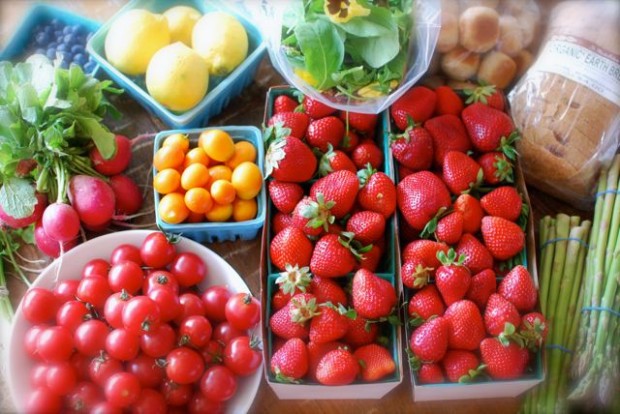I talk a lot about organic food on this blog. Mostly because the more I learn about conventional farming and food production, the more I’m convinced organic food should really just be called food.
It’s true that choosing organic is often more expensive. In some categories – like salad greens – the organic option is only a tiny bit more expensive and thus accessible to nearly everyone shopping for those products. But in other areas – especially dairy, meat and eggs – the cost is quite a bit more.
Like most families, we have a limited amount of money to spend on food. Yet I find myself buying more and more organic items. I stick to our budget by planning strategically.
The following are my go-to tips for eating organic on a budget:
- Pick one food or food group to start with. Whether you choose to buy organic produce from the Dirty Dozen list, organic dairy, or organic meats, it’s easier and less overwhelming to move toward organic shopping when you start with one category at a time. After you’ve mastered a certain category of organic food, add another food or group to your organic shopping list.
- Buy what’s in season. If you buy what’s on sale or in season, organic food costs are comparable to the cost of conventional food. Rather than heading to the store with a definitive list, write down something generic like “3 vegetables and 3 fruits” then look for whatever organic, or locally grown produce is on special.
- Make meatless meals more often. Organic and pasture-raised meats are pricier than conventional meats, so to avoid going over-budget, plan at least a few meatless meals each week. It’s easy to make meals around cheaper proteins like tofu, beans, lentils, or a fried egg – and these taste good too!
- Buy in bulk. When something’s on sale or in season, buy a lot and freeze some. You’ll love having a store of organic food at home for busy weeknights or last-minute snacks.
- Shop at the farmer’s market. Organic produce is often cheaper at your local farmer’s market than at the grocery store. Since the middleman is cut out when you buy directly from the farmer, you get the best price (and so do they).
- Grow some food. If you have a big yard, go to town! If you don’t (or don’t consider yourself a Green Thumb), plant some fresh herbs or tomatoes in some large pots. Not only will your organic produce be essentially free, but it will taste better than you could have imagined.
Remember, even small steps toward a more organic lifestyle can make your family – and the planet – a whole lot healthier.







4 Comments
Amanda Cowan
April 30, 2014 at 9:58 pmGreat tips! We’ve just moved from ‘buying organic when we can’ to being more aggressive and buying only organic. Sticking with the in season items and eating less meat is a great tip. I find that it definitely makes it easier. I wish I could hit the farmers markets here more, though there are many things we just can’t get too much locally. However, one great source you might mention for eggs are local high schools that have agriculture programs. I found that a few of the high schools here keep chickens for the students to take care of and often will sell the eggs for a very reasonable price. The school I went to sold them for $2/dozen. Plus, we were allowed to visit and ask the students questions about how they’re cared for. Now I find them from a neighbor (would keep chickens ourselves if our HOA allowed it) that lives a bit closer but I love the idea of supporting the program and I do stop by the school whenever I’m in that area.
Amelia Winslow
May 2, 2014 at 11:16 amI love this idea, Amanda!
Emily @ Zweber Farms
May 6, 2014 at 6:38 pmGreat tips! Also consider buying meat in bulk from a local farmer. Most states have a site dedicated to finding local farmers. Buying a quarter of a beef animal is much cheaper than buying all the cuts individually. Another bonus is that you get to meet your farmer. Deep freezers can be found on CraigsList for a good price. Also consider buying more of the inexpensive cuts. For example, roast a whole chicken (which can be use for 2 or more meals) instead of buying chicken breasts.
Amelia Winslow
May 7, 2014 at 8:42 amSuch great meat tips, Emily. I appreciate you chiming in!
We live in a small condo so can’t do the big freezer thing, but for people living in houses this is such a great option. And absolutely everyone can buy a whole chicken or less expensive cuts. I often use a whole chicken in 3-4 meals, then make stock, so it’s very cost effective. Thank you!